
To go to Venice in search of gardens might seem to be founded more in hope than expectation. No city is more beautiful or more romantic, but few would stake its claim to fame on horticulture.
There are some public gardens, but space is so short and so hard won that gardens might seem an impossible luxury for most. But spend any time at all beyond the obligatory visit to St Mark's Square and you will catch glimpses of plants in passing and snatches of possible gardens through gateways and doors. There is wisteria reflected in the water as it falls in swags over a wall, a magnolia hedged between two buildings, or ivy capping a wall in green billows.
The signs are elusive and enigmatic, with little clue as to the scale or content of any gardens within - but it is evidence that they are there.
Gardens are essentially rooted in earth and Venice is nothing if not a city of water. However, the two do combine and at times gloriously so.
There are few better ways to start a day than stepping from one's hotel straight into a boat and setting off down the back canals and opening out onto the Grand Canal early on a spring morning to visit gardens. No journey in any city in the world is more beautiful and the gardens are all integrally bound into this beauty rather than being exceptional.
Making gardens
Some of this is to do with the way that Venice's existence depends upon the same contract with nature that every gardener deals with. It is a bargain whereby mankind manipulates and controls the natural world to make something beautiful and useful, but on licence - and that licence can be withdrawn by weather, negligence or misjudgement at any moment.
This story is from the {{IssueName}} edition of {{MagazineName}}.
Start your 7-day Magzter GOLD free trial to access thousands of curated premium stories, and 9,000+ magazines and newspapers.
Already a subscriber ? Sign In
This story is from the {{IssueName}} edition of {{MagazineName}}.
Start your 7-day Magzter GOLD free trial to access thousands of curated premium stories, and 9,000+ magazines and newspapers.
Already a subscriber? Sign In

A new plot for tasty crops
Taking on a new allotment needn't be hard work. By simply following a few easy tips you can have bumper crops in no time, just like Alessandro Vitale

We love July
July is an island floating between the joy of June and the slightly fatigued month of August. It's a grown-up month: the year has shrugged off its adolescent exuberances, the weather is (hopefully) warm enough for ice cream to be one of your five a day, the sea should be swimmable without (too much) danger of hypothermia and thoughts will be of holiday shenanigans and family barbecues. School's out this month, the next tranche of glorious summer colour is washing across our borders and it's my birthday. Lots of reasons to give three rousing cheers for July!
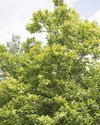
YOUR PRUNING MONTH
Now, at the height of summer, Frances Tophill shows how to boost your plants' health and productivity with a timely cut

Hassle-free harvests
Flowers are out in abundance this month and for Jack Wallington, many of these blooms make delicious, low-effort pickings
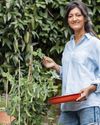
Bite-sized bounties
Glorious doorstep harvests can easily turn into gluts, so let Rukmini Iyer's recipes help you savour every last bit
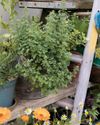
Upcycled outdoor living
Create unique and stylish garden features for minimal cost using reclaimed materials and simple DIY skills. Helen Riches shares four step-by-step projects and more inspiring eco tips

Secrets of a COLOURFUL GARDEN
Buildings and landscapes can play a vital role in supercharging your space, as Nick Bailey demonstrates
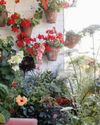
Greening up a city balcony
Looking for sustainable, small-space gardening ideas? Take inspiration from Oliver Hymans' transformed balcony garden in north-east London - now a lush, green haven for humans and wildlife

The dry and mighty garden
As we adapt our gardens to a more volatile climate, Alan Titchmarsh reveals how to create a drought-tolerant plot and picks his top plant performers
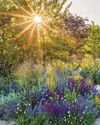
Nature knows best
Carol Klein explains how to choose plants for specific growing conditions, based on what has naturally adapted to thrive there